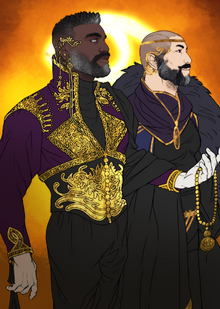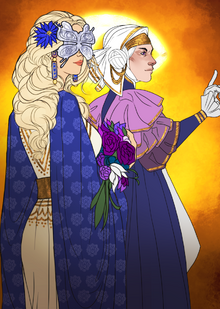More actions
No edit summary |
No edit summary |
||
| Line 10: | Line 10: | ||
==Origins== | ==Origins== | ||
In the | Unionism as a religion was created in the year 5 AC when Emperor Theomar (the founding Emperor of Regalia) proclaimed the Creed (the holy Scripture) as visions received from the Everwatcher. In the beginnings of the Empire, the faith was slow to spread, but through providence and divine intervention, as well as Regalia's military spread and aggressive missionary proselytizing, Unionism quickly spread from its small cult-like origins to a world-religion. It has over the years also absorbed Gods from smaller religions, and included Gods form other Religions to become a very all-inclusive cosmopolitan Religion. While most other Religions are Race specific with some caveats, Unionism is a cross-Race religion that invites all Races to join under the Everwatcher. | ||
==Schisms== | ===Schisms=== | ||
Unionism has had a series of schisms in the past centuries, notably the Evintarian schism which was the result of dogmatic differences and a civil war, and the Supremoclast schism which followed a more critical and humanist conscience of the people. This resulted in the Religion splitting in three (with some smaller cults that were later re-absorbed) that engaged in some degree of religious war on each other to proclaim supremacy over the concept of the Everwatcher. It took several centuries, but in recent times, the conflict wounds healed, and the priests of all Schisms came together to re-merge the religious communities, founding the Unionist Divine, which represents the current faith and priesthood. Some Cults like the Evintarian and Guided Cult still exist, however these add optional additional Gods, rather than radically diverging from religious beliefs. | |||
==Core Beliefs== | |||
Unionism is a polytheistic Religion with one single superior being and his mortal vessel on earth, and a whole host of paired Gods who all offer specific lessons of the faith. The Religion's primary objective is world domination, that is to say, to create a globe-spanning Regalian Empire that can create eternal peace and stability, and bring about paradise by banishing war and suffering and death, and bring back all the dead from the Afterlives into an eternal paradise. Each of the God Pairs provides what the Unionists call, a Golden Lesson, which acts like a virtue, and opposes a sin in the belief of Unionism. If a person dies and their soul is judged by the Everwatcher they are found to be virtuous, they join the Everwatcher on the Great Stairway where they watch down on the living in wait for paradise to come. If they are deemed sinful, they are re-incarnated in the mortal world, so they are given another chance. The following Golden Lessons can be found in Unionism: | |||
* The Golden Lesson of Theomar and Thedmir: | |||
* The Golden Lesson of Ness and Eora: | |||
* The Golden Lesson of Juvin and Glanzia: | |||
* The Golden Lesson of Akkest and Alexander: | |||
* The Golden Lesson of Theomar and Thedmir: | |||
* The Golden Lesson of Theomar and Thedmir: | |||
* The Golden Lesson of Theomar and Thedmir: | |||
* The Golden Lesson of Theomar and Thedmir: | |||
* The Golden Lesson of Theomar and Thedmir: | |||
* The Golden Lesson of Theomar and Thedmir: | |||
* The Golden Lesson of Theomar and Thedmir: | |||
* The Golden Lesson of Theomar and Thedmir: | |||
==Gods and Goddesses== | ==Gods and Goddesses== | ||
Unionism differs from other Religions, in that it has Duo-Gods. All Duo-Gods are divine and each have divine powers in the afterlife (though some Gods may be yet living). Unionists worship all Gods equally, though they may choose specific Patron gods which they worship more. The Everwatcher acts like an overarching God of Gods, but the Everwatcher cannot directly be interacted with, so most people end up praising the Everwatcher through the Gods and Goddesses. Unionism also has the Cults further below. Cults add Gods onto the standard Pantheon, but they are not mandatory for vanilla Unionists who don't worship the Cults. It is possible to be a believer of both Cults. | Unionism differs from other Religions, in that it has Duo-Gods. All Duo-Gods are divine and each have divine powers in the afterlife (though some Gods may be yet living). Unionists worship all Gods equally, though they may choose specific Patron gods which they worship more. The Everwatcher acts like an overarching God of Gods, but the Everwatcher cannot directly be interacted with, so most people end up praising the Everwatcher through the Gods and Goddesses. Unionism also has the Cults further below. Cults add Gods onto the standard Pantheon, but they are not mandatory for vanilla Unionists who don't worship the Cults. It is possible to be a believer of both Cults. | ||
| Line 71: | Line 79: | ||
|} | |} | ||
</td><td style="vertical-align: top; width: 50%;"> | </td><td style="vertical-align: top; width: 50%;"> | ||
<span style="font-size:150%;><center>'''Martial Gods Allest and | <span style="font-size:150%;><center>'''Martial Gods Allest and Isebrand'''</center></span> | ||
{| | {| | ||
[[File:GAYS.png|220px|caption|left]] | [[File:GAYS.png|220px|caption|left]] | ||
| | | | ||
* '''Name:''' Allest (right) God of Warriors, | * '''Name:''' Allest (right) God of Warriors, Isebrand (left) God of Gladiators. | ||
* '''Patron:''' Soldiers, Generals, Commanders, Gladiators, Warriors, Homosexuals. | * '''Patron:''' Soldiers, Generals, Commanders, Gladiators, Warriors, Homosexuals. | ||
* '''Symbols:''' Two crossed holy swords, one with blood, and one dripping with tears. | * '''Symbols:''' Two crossed holy swords, one with blood, and one dripping with tears. | ||
| Line 83: | Line 91: | ||
* '''Allies:''' Cemaan Worshipers, Bard & Njal Worshipers, Bloodcast Knights. | * '''Allies:''' Cemaan Worshipers, Bard & Njal Worshipers, Bloodcast Knights. | ||
* '''Enemies:''' Pacifists, cowards, enemies of Unionism and those who attack Priests. | * '''Enemies:''' Pacifists, cowards, enemies of Unionism and those who attack Priests. | ||
* '''Rituals:''' Allest and | * '''Rituals:''' Allest and Isebrand were lovers in live and death, where most of their rituals involve some kind of brotherly oath, a promise to protect someone until one's dying breath, or swearing fealty and undying loyalty to an overlord in war. Allest and Isebrand were glorious warriors each in their own right, so in many ways, prayer before battle and battle itself is a form of worship in their names, as is love persevering through war. | ||
|} | |} | ||
</center> | </center> | ||
| Line 115: | Line 123: | ||
* '''Allies:''' Cemaan Worshipers, Bard & Njal Worshipers, Bloodcast Knights. | * '''Allies:''' Cemaan Worshipers, Bard & Njal Worshipers, Bloodcast Knights. | ||
* '''Enemies:''' Pacifists, cowards, enemies of Unionism and those who attack Priests. | * '''Enemies:''' Pacifists, cowards, enemies of Unionism and those who attack Priests. | ||
* '''Rituals:''' There aren't strictly any rituals for Alexander, as he is only the Temporary Vessel. When Alexander dies, the next Emperor will take his place as the Vessel God, so that only ever the living Emperor will be Vessel God. It's also worth noting that | * '''Rituals:''' There aren't strictly any rituals for Alexander, as he is only the Temporary Vessel. When Alexander dies, the next Emperor will take his place as the Vessel God, so that only ever the living Emperor will be Vessel God. It's also worth noting that Gladiator God Isebrand's name in life was also Alexander, as Isebrand is this Alexander's ancestor, so the latter is styled "Alexander II", and the former is given the Divine name of Isebrand. | ||
|} | |} | ||
</center> | </center> | ||
Revision as of 02:36, 15 October 2023
| Unionism | |
|---|---|
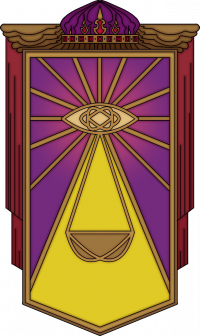 | |
| Religion | |
| Pronunciation | Yoon-yen-is-m |
| Origins | Emperor Theomar |
| Deities | |
| The Everwatcher and various other Gods and Goddesses | |
Origins
Unionism as a religion was created in the year 5 AC when Emperor Theomar (the founding Emperor of Regalia) proclaimed the Creed (the holy Scripture) as visions received from the Everwatcher. In the beginnings of the Empire, the faith was slow to spread, but through providence and divine intervention, as well as Regalia's military spread and aggressive missionary proselytizing, Unionism quickly spread from its small cult-like origins to a world-religion. It has over the years also absorbed Gods from smaller religions, and included Gods form other Religions to become a very all-inclusive cosmopolitan Religion. While most other Religions are Race specific with some caveats, Unionism is a cross-Race religion that invites all Races to join under the Everwatcher.
Schisms
Unionism has had a series of schisms in the past centuries, notably the Evintarian schism which was the result of dogmatic differences and a civil war, and the Supremoclast schism which followed a more critical and humanist conscience of the people. This resulted in the Religion splitting in three (with some smaller cults that were later re-absorbed) that engaged in some degree of religious war on each other to proclaim supremacy over the concept of the Everwatcher. It took several centuries, but in recent times, the conflict wounds healed, and the priests of all Schisms came together to re-merge the religious communities, founding the Unionist Divine, which represents the current faith and priesthood. Some Cults like the Evintarian and Guided Cult still exist, however these add optional additional Gods, rather than radically diverging from religious beliefs.
Core Beliefs
Unionism is a polytheistic Religion with one single superior being and his mortal vessel on earth, and a whole host of paired Gods who all offer specific lessons of the faith. The Religion's primary objective is world domination, that is to say, to create a globe-spanning Regalian Empire that can create eternal peace and stability, and bring about paradise by banishing war and suffering and death, and bring back all the dead from the Afterlives into an eternal paradise. Each of the God Pairs provides what the Unionists call, a Golden Lesson, which acts like a virtue, and opposes a sin in the belief of Unionism. If a person dies and their soul is judged by the Everwatcher they are found to be virtuous, they join the Everwatcher on the Great Stairway where they watch down on the living in wait for paradise to come. If they are deemed sinful, they are re-incarnated in the mortal world, so they are given another chance. The following Golden Lessons can be found in Unionism:
- The Golden Lesson of Theomar and Thedmir:
- The Golden Lesson of Ness and Eora:
- The Golden Lesson of Juvin and Glanzia:
- The Golden Lesson of Akkest and Alexander:
- The Golden Lesson of Theomar and Thedmir:
- The Golden Lesson of Theomar and Thedmir:
- The Golden Lesson of Theomar and Thedmir:
- The Golden Lesson of Theomar and Thedmir:
- The Golden Lesson of Theomar and Thedmir:
- The Golden Lesson of Theomar and Thedmir:
- The Golden Lesson of Theomar and Thedmir:
- The Golden Lesson of Theomar and Thedmir:
Gods and Goddesses
Unionism differs from other Religions, in that it has Duo-Gods. All Duo-Gods are divine and each have divine powers in the afterlife (though some Gods may be yet living). Unionists worship all Gods equally, though they may choose specific Patron gods which they worship more. The Everwatcher acts like an overarching God of Gods, but the Everwatcher cannot directly be interacted with, so most people end up praising the Everwatcher through the Gods and Goddesses. Unionism also has the Cults further below. Cults add Gods onto the standard Pantheon, but they are not mandatory for vanilla Unionists who don't worship the Cults. It is possible to be a believer of both Cults.
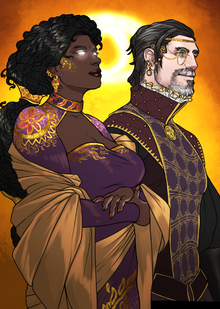
|
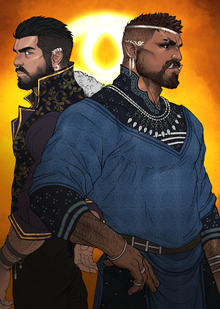
|
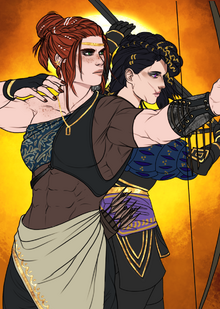
|
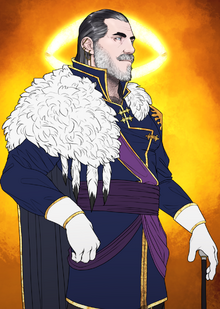
|
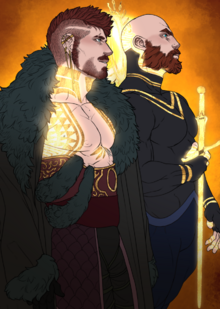
|
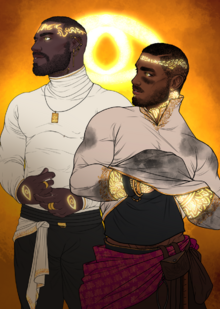
|
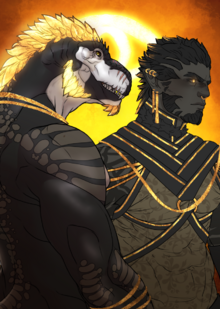
|
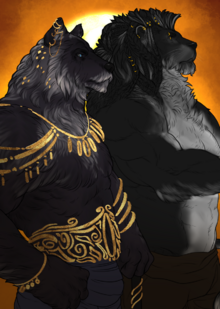
|
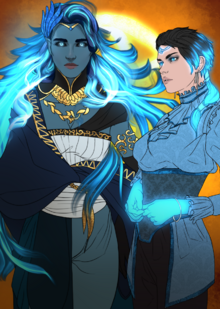
|
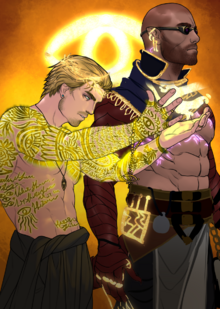
|
Priestly Activities
Dogmatic Unionist priests are part of the so-called Dogmatic Religious Community. At the very top is the Concilly Council. Originally this organization had a leader called the Supreme Reverend, however the Supreme Reverend position was abolished when the last Supreme Reverend discovered insidious corruption within the religious community, tried to expose it, and was assassinated for it. To compensate, Conclave determined that the Dogmatic community should henceforth be ruled by a Council of elder Arch-Celates. Below the Concilly Council, are the Arch-Celates, which are equivalents to Dukes in the Regalian Empire. They wield considerable power and rule over vast areas of land, subdivided into Celeries. Below the Arch-Celate is the Celate, or just the average priest. Each Celate administrates a Celerie, which is usually a piece of land donated to the clergy where they maintain temples, shrines, and convents, while also producing crops and tending to cattle. Celates perform all religious tasks such as confession, preaching, hearing concerns, and simply taking care of Unionist needs like a social caretaker or mental health worker. Arch-Celates on the other hand are more administrative in that they take care of the treasury, any military attached to the religious orders, and communication between the Concilly Council and the vast wide-spread Unionist elements. Formally the Emperor is the leader of the Holy Seat, which is more of a group term for the Palace and the Concilly Council grouped together, but historically Emperors have interfered very little in the day to day running of the Celeries, and as such, this fact is usually ignored, the Emperor being considered a completely independent entity. This has also historically separated the Emperor from controversy among the Celates, and vice versa.
The Nuance of Godly Tribalism
For those who have lasted long enough to read to this point, it should have become obvious that not all Gods and Goddesses see eye to eye, and that some of them even directly contradict each other. While the Creed theoretically exists to apply the correct interpretation and lessons to be learned from the Gods and Goddesses, reality often finds for example Elen and Taal followers at odds, and Elia and Niall & Nolan followers at odds because of ideological differences. Unionism does not demand the universal worship of every God and Goddess, often the faithful only pick a few that really apply to them, after all, why would an Anglian peasant worship the God of King and Emperors if only in passing to praise his name for the Creed and Prophecy. No God or Goddess is also more or less correct than another, in the eyes of the Everwatcher, each God has some degree of validity, and some degree of error which is prone in the Sin of Creation, both in the fact that even Gods and Goddesses can sometimes act in error, but also in that mortals can apply the wrong interpretation of their lessons to reality around them. It is important never to call another Character a heretic for preferring one God or Goddess over the other and disregarding the preaching of one to uphold those of another.
Trivia
- Unionism used to be mandatory for nobility somewhere during the second century after Cataclysm, though this Holy Law was removed when the war against the Skagger Horde ceased, and the Empire benefited more from including non-Unionists into the peerage. An exception had always been made for the Altalar nobles of Solvaan origins in Solleria however, called the Confessions of Melennar.
- Sectarian violence largely came to an end at the turn into the fourth century as the last attacks on Vultragon Unionist by state forces ceased, and an uneasy truce was signed between the Schism religious communities. They still do not see eye-to-eye, and the different Schismatic groups still prod at each other, but instead of murdering each other over sectarian differences, they mostly fight with words nowadays, a legacy of the Kleine Rechnung, the document that called for the truce.
- Despite Elen's absorption into Unionism, the Breizh still maintained a high level of cultural autonomy, some even clinging to old beliefs. As such, even when Magic became illegal in the Empire, the Breizh Aelrrigan Order continued to find and train Mages safely in their sanctuaries while the rest of the Empire turned to brutal oppression (and the Magic part of Elen was suppressed from dogma). Elen's faithful among the Aelrrigan Order are commonly cited as the reason why Magic acceptance eventually returned, and Elen's magical nature in theological teachings was returned.
| ||||||||||
| Accreditation | |||||||
|---|---|---|---|---|---|---|---|
|
| ||||||
